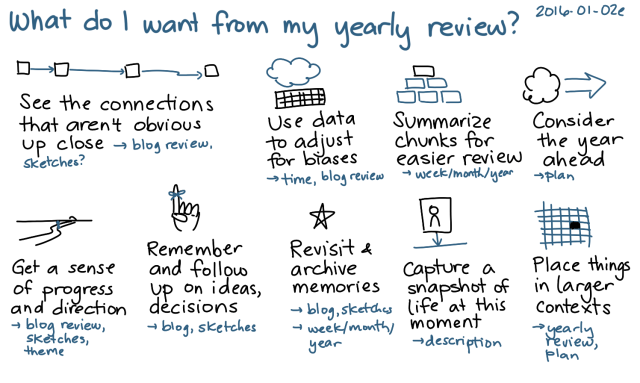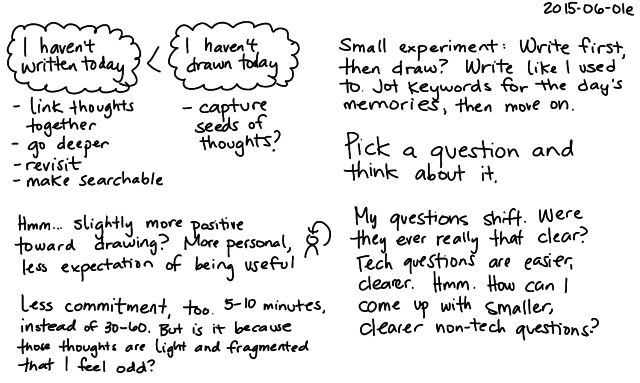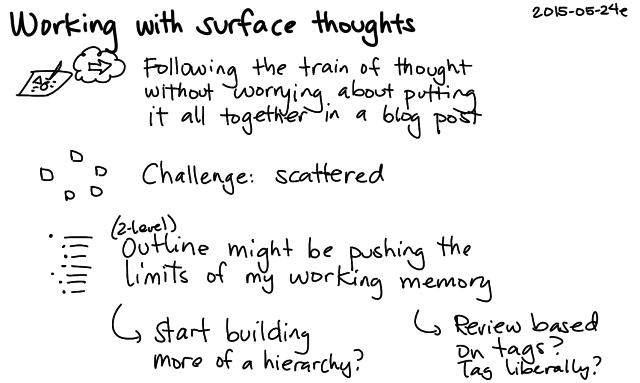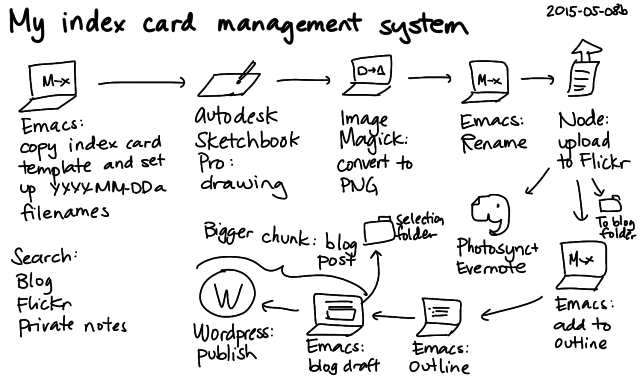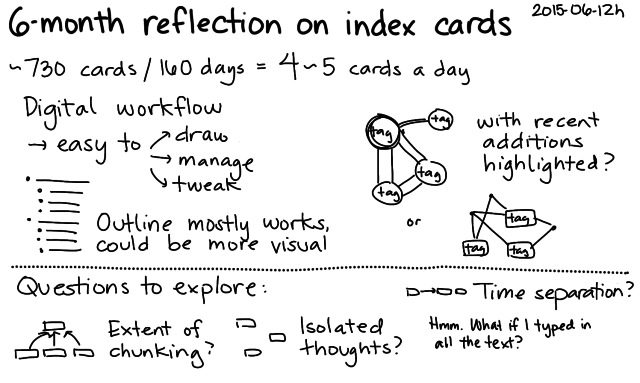What do I want to think through when writing on my phone?
| kaizen, writingMy first priority is to get thoughts out of my head and into a form I can work with. This often becomes an explosion of lists and keywords, which can be handy for thinking and drawing, but not for my blog posts. It helps me clear my mind and be less distracted. It lets me make progress instead of covering the same ground. It also helps me make better decisions. I can see the costs and benefits more clearly when they’re written down. I can brainstorm options and compare them. I can review the decisions afterwards, too.
Prose makes things slower to capture and harder to read on my phone, but also a little easier to search or reflect on after a while, and possibly good for review or conversation when turned into a blog post.
And then there’s stuff I’d flesh out in writing anyway, like my weekly/monthly/yearly reviews. Those start off as sketches on my computer, then lists of keywords, and then paragraphs on my phone.
If my list is cluttered, it’s hard to pick one thought and follow it through. I end up adding little bits here and there, and I’m not sure how useful that is. Things below a couple of screens get ignored. It might be helpful to dedicate some time to processing. I can either flesh out the top idea on the stack, or move it to my inbox if it needs computer time.
I don’t have to worry too much about writing for other people’s benefit. That can come later, when I have more focused time. People can always choose what to read and what to skim or skip. What’s important is that I think things through and then capture them for later review.
So, how can I do this more effectively? Where are my gaps?
- Motivating questions, not just a scratchpad of ideas: It’s useful to ask questions when I’m going to change something based on the answer. For example, I can describe the gaps and points of friction, then explore why those are so, and then come up with ideas and actions.
- Reviews are less motivating, but I can get the ball rolling by focusing on tidbits rather than overviews. It’s hard to see context on a small screen.
- I don’t have to spend a lot of time picking the best thing to write about. Practically everything will move me forward, even if the distances vary. I can write and write and write, and then reflect.
- If I don’t feel like writing, I can always snuggle or sleep. No need to force it.
The best time to write is when I’m nursing A- and she’s drifting off to sleep, but is awake enough to root if I try to move away. Trade-offs / other things I could be doing during that time:
- Sleeping: Good up to a certain point. It’s handy to use A-‘s first nap to catch up on sleep if needed, but I don’t want to sleep too much.
- Browsing social media: Tempting time sink. Occasionally useful or interesting, but best in small doses.
- Answering email: Nice thing to do, although expectations are low. Some things can only be answered when I’m at my computer.
- Prioritizing my to-do list and adding items to it: Helps me hit the ground running during computer time.
- Reading research and tech stuff: Gives me ideas to explore when I’m at my computer. Less efficient than reading when I’m on my laptop, but it’s okay to just index things for later exploration.
- Reading e-books: sometimes useful, especially if I pick my questions and titles carefully.
- Reading fiction: occasionally entertaining, although often bleh. Maybe I should try library recommendations.
- Playing games: my interest comes and goes. Exercises problem-solving. Artificial sense of progress.
I think it makes sense to prioritize sleep, then writing, with maybe a notification-based pomodoro for social media during breaks. If I don’t feel like writing, I can use the time to learn more about tech or parenting. Let’s see if I can find a pomodoro app that’s compatible with a sleeping baby, or if I can make something using Tasker…

